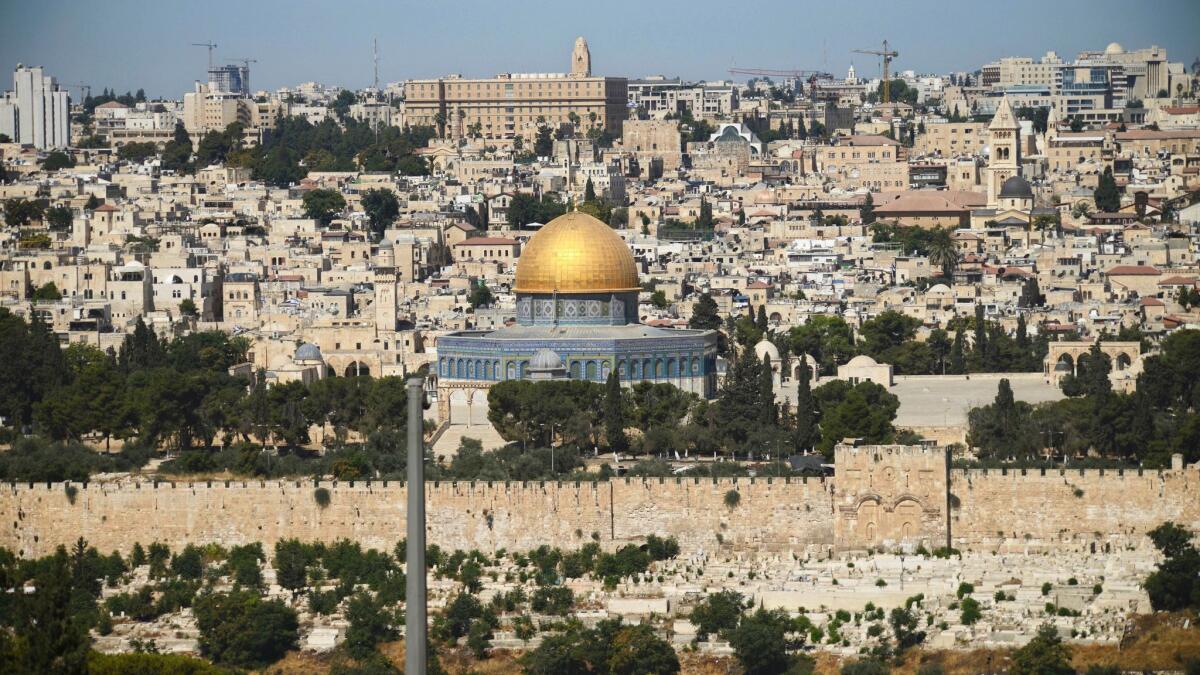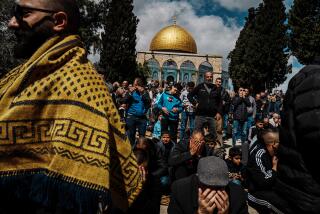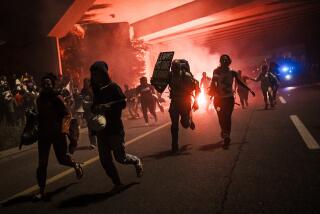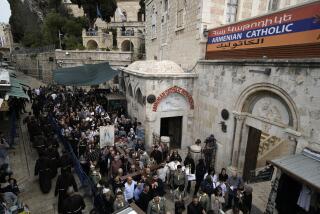Crisis over Jerusalem holy site intensifies ahead of Friday prayers

Days of escalating clashes and a diplomatic crisis over recently installed Israeli metal detectors at the Al Aqsa Mosque compound in Jerusalem’s Old City are stoking concern of a new wave of violence ahead of Friday prayers.
Girding for a surge of friction at noontime prayers on the Muslim day of rest, the Israeli army put five extra battalions on alert. Meanwhile, international diplomats called for a compromise as Israel and Jordan looked for a path to defuse a standoff before Friday.
Israeli authorities installed the security equipment Sunday, two days after a shootout on the esplanade — holy to both Jews and Muslims — in which three Israeli Arabs with homemade machine guns killed two Israeli Druze policemen and were then killed by security forces.
Palestinian officials and the Muslim Waqf authority responsible for the Old City site have rejected the metal detectors as unilateral change to long-standing agreements on access and management of the site and instructed worshipers to hold demonstrations and prayers outside the complex rather than pass through the metal detectors. The Old City protests since then have devolved into daily rioting and clashes with police and spread to other Palestinian neighborhoods of East Jerusalem.
The Israeli-Jordanian dialogue is being conducted via the countries’ intelligence and security agencies — a channel used in the past to resolve potentially explosive conflicts around the Jerusalem holy site, said Oded Eran, a former Israeli ambassador to Jordan familiar with the contacts.
“Whether there will be a climbing down by all sides involved, I don’t know,” said Eran, a fellow at the Institute for National Security Studies, a Tel Aviv University think tank. “They will certainly need an elegant formula which will create a situation in which weapons can’t be brought into the compound and … won’t be seen as a regime totally controlled by Israel.”
Israeli security experts have said it will be practically impossible to have tens of thousands of Palestinians pass though the metal detectors during holy days.
The holy esplanade is called the Noble Sanctuary by Muslims who believe it’s the spot where the Prophet Muhammad rose to heaven. Jews call it the Temple Mount for the two ancient temples that once stood on the place.
Israel has said the metal detectors are necessary to tighten security at the sensitive site after three men from the Israeli Arab city of Umm Al Fahm used guns smuggled into the compound last week. On Thursday, Israeli police released a video purporting to show attackers and an accomplice in and around the plaza with a bag of weapons in the compound before the attack.
Palestinians said the metal detectors mark a unilateral restriction on access to worshipers by Israel, and they fear that Prime Minister Benjamin Netanyahu will go along with calls by members of his right-wing coalition to assert Israeli sovereignty there and drop a ban on Jewish prayer on the plaza.
The deaths, the two-day closure of the Temple Mount, and the metal detectors there have seemingly left Jerusalem and the West Bank teetering on the brink of a wider conflict. Disputes over access to the plaza sparked the second Palestinian intifada in 2000, as well as weeks of stabbing and car ramming attacks in 2014 and 2015. In both disputes, Jordan and Israel were able to reach a series of understandings that helped calm tensions.
In two separate incidents this week, the Israeli army said it shot and killed two Palestinians who tried to run over and stab soldiers at checkpoints in the West Bank.
Palestinian residents of the Old City said clashes with police usually peak in the evening, when hundreds have faced off with Israeli security forces in riot gear.
“We will not go through the electric gates. This is not something that belongs to them,’’ said Yousef Hammad, 53, who works at a souvenir shop near the entrances to the plaza. “If they don’t let people in, it will be a big mess for all of Palestine, not just here.”
Palestinian Authority Prime Minister Rami Hamdallah on Thursday called on the international community to pressure Israel to reverse its decision on the metal detectors, and President Mahmoud Abbas on Wednesday cut short a visit to China in order to return to Ramallah to deal with the crisis.
Jordanian Foreign Minister Ayman Safadi said Wednesday that it was up to Israel to defuse the crisis, according to the official Petra news service. “Israel’s respect for the historic and legal status in the Al Aqsa Mosque and the end of all attempts to create new facts on the ground is the key to restoring calm in the holy shrines,” he said.
The U.S. and the United Nations issued statements urging the sides to work together to find a compromise.
“I am deeply concerned by the recent surge in tensions and violence around the holy esplanade in the Old City of Jerusalem,’’ said Nickolay Mladenov, the U.N. special coordinator for the Middle East peace process in a statement Thursday. “I call on all concerned parties to de-escalate the situation and on moderate voices to speak up against those who try to fuel tensions.”
The White House press secretary released a statement urging Israel and Jordan to “make a good faith effort to reduce tensions and find a solution that assures public safety and the security of the site and maintains the status quo.”
Mitnick is a special correspondent.
More to Read
Start your day right
Sign up for Essential California for news, features and recommendations from the L.A. Times and beyond in your inbox six days a week.
You may occasionally receive promotional content from the Los Angeles Times.






